Spain’s prime minister visits China to strengthen ties with Trump's top
tariff target
[April 11, 2025] By
SUMAN NAISHADHAM
MADRID (AP) — Spain’s Prime Minister Pedro Sánchez is visiting China on
Friday, his third trip to the country in two years as his government
seeks to boost investment from the Asian giant amid global economic
uncertainty caused by a chaotic U.S. tariff policy.
Sánchez met with Chinese President Xi Jinping and was expected to meet
as well as business leaders from several Chinese companies, many of
which produce electric batteries or renewable energy technologies.
The visit comes at a complex moment for Europe and China. The tariffs
announced last week — and then paused — by U.S. President Donald Trump
could mean that the European Union pursues more trade with China — the
world’s third-largest consumer market after the United States and the
EU. There is also growing concern in the EU about China flooding the
bloc with discounted goods as a result of U.S. tariffs, which would hurt
European producers.
Sánchez's government has said that EU-member Spain wants to expand its
economic ties with China.
“A trade war favors no one. We all will lose,” Sánchez said after
meeting with Vietnamese leaders in Hanoi on Thursday, where he signed
commercial agreements ahead of his visit to Beijing.
Spain's government spokeswoman Pilar Alegría said earlier this week that
Sánchez's trip “has special importance" and is an opportunity to
"diversify markets” — Spain could see as much as 80% of its exports to
the U.S. impacted by Trump’s tariffs.
Warnings from Washington
U.S. Treasury Secretary Scott Bessent called out Spain for its move
toward China, saying on Tuesday that Spain — or any country that tries
to get closer to China — would be “cutting their own throat” because
Chinese manufacturers will be looking to dump goods that they can’t sell
in the U.S.
“Expanding the trade relations that we have with other countries,
including a partner as important as China, does not go against anyone,”
Spain’s Agriculture Minister Luis Planas, who is accompany Sánchez, said
in Vietnam on Wednesday.
“Everyone has to defend their own interests," Planas said.
Spain leans pro-China as EU is divided
Spain — the eurozone's fourth-largest economy and a leader in growth —
has in recent years been less adversarial toward China than other EU
countries. After initially supporting EU tariffs placed last year on
Chinese-made electric vehicles, which European leaders have said enjoy
unfair advantages compared to European car makers, Spain abstained from
voting on the customs duty.
Planas insisted that Spain’s approach to China “contributes to the
collective effort made by certain countries in the European Union to get
out of this situation.”
"Spain’s position has changed to be more pro-China ... than the the
average European country," said Alicia García-Herrero, an economist for
Asia Pacific at the French investment bank Natixis and an expert on
Europe's relations with China.
[to top of second column] |

Chinese President Xi Jinping, right and Spanish Prime Minister Pedro
Sanchez speak as they walk along the gardens of Diaoyutai Guest
House after a meeting in Beijing, China, Friday, April 11, 2025.
(Andres Martinez Casares/Pool Photo via AP)
Clean energy and pork products
Spain is a major supplier of pork to China, providing about 20% of
China's imports, according to Interporc, a Spanish association of
pork producers.
“For us, China is the main market,” said Daniel de Miguel, deputy
director of Interporc.
The Southern European country, which generated 56% of its
electricity last year from renewable sources, needs Chinese critical
raw materials, solar panels and green technologies — similar to
other European countries transitioning away from fossil fuels.
In December, Chinese electric battery company CATL announced a 4.1
billion euro ($4.5 billion) joint venture with automaker Stellantis
to build a battery factory in northern Spain. That followed deals
signed last year between Spain and Chinese companies Envision and
Hygreen Energy to build green hydrogen infrastructure in the
country.
The Spanish leader’s visit was announced before the Trump
administration unveiled its tariff plan.
Spain, as a EU nation, had initially received a 20% blanket tariff
that Trump has now lowered to 10% for most countries other than
China for 90 days. The bloc also faces a U.S. duty of 25% for cars,
steel and aluminum.
China, meanwhile, is facing a crippling, total 145% duty. When Trump
announced Wednesday that China faced 125% tariffs, he did not
include a 20% tariff on China tied to its role in fentanyl
production.
Sánchez, who has made more trips to China than the leaders of
Germany or Italy, last visited in September, when he met with Xi
amid EU-China trade tensions. While China's investments in Spain
have grown, the Iberian nation trades less with China than Germany
or Italy.
García-Herrero, the economist at French bank Natixis, stressed the
political value of the trip for Sánchez at a time when his leftist
minority coalition lacks the support needed to get much passed at
home and while Europe may be looking to thaw its strained relations
with China.
For Spain, the key thing is "to get a leadership position in Europe
at a time when the transatlantic alliance is not only at risk but in
shambles,” she said.
___
Associated Press writer Joseph Wilson in Barcelona, Spain,
contributed to this report.
All contents © copyright 2025 Associated Press. All rights reserved |